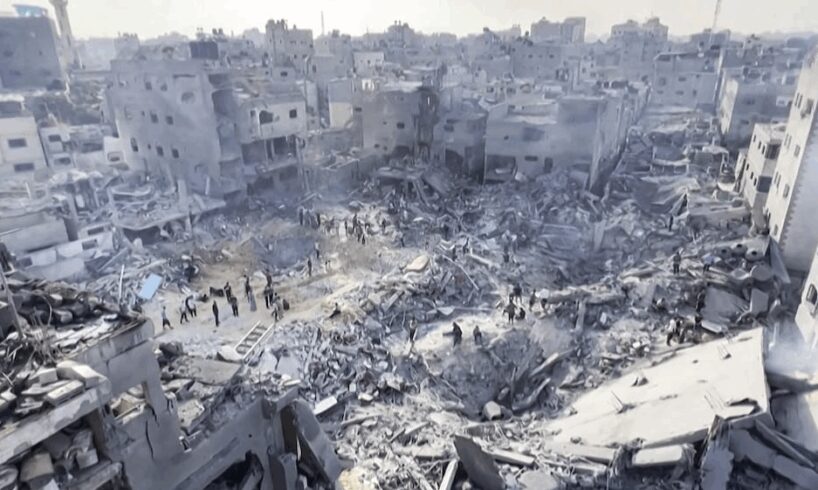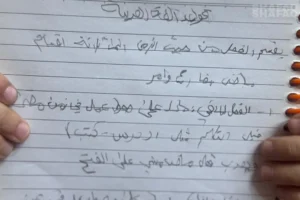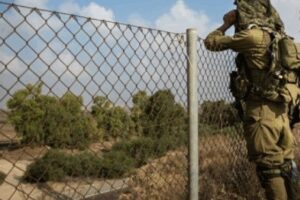
Shafaq News
Once confined to fringe discussion, the
relocation of Palestinians—whether framed as “voluntary migration” or outright
forced transfer—has become part of mainstream policy discourse. The shift has
been driven by statements from senior officials, leaked strategic documents, and
modeling by influential think tanks, blending ideological motivations with
complex legal and humanitarian challenges.
In July 2025, Israeli Defense Minister Israel
Katz proposed establishing a “humanitarian city” in Rafah, under full military
control, as a holding zone for displaced Gazans. Israeli well-known human
rights lawyer Michael Sfard described the plan as “a blueprint for crimes
against humanity,” warning that it amounted to “population transfer to the
southern tip of Gaza in preparation for deportation outside the strip.” The
Wall Street Journal reported that feasibility studies had been tied to the
plan, though the consulting firm named later denied involvement.
This follows an October 2023 leaked “concept
paper” from Israel’s Intelligence Ministry that examined scenarios for Gaza’s
future, including relocating its 2.3 million residents to Egypt’s Sinai
Peninsula via tent camps evolving into permanent settlements. While the
government dismissed the paper as hypothetical, the prospect of systemic displacement
sparked alarm domestically and internationally.
In March 2025, the Boston Consulting Group
modeled a relocation scheme to Somalia, Somaliland, Egypt, Jordan, and the UAE,
estimating that 25 percent of Gazans might accept relocation “voluntarily,”
with projected economic benefits of $4.7 billion for host states. UN officials
and Arab governments condemned the idea as a modern form of ethnic cleansing.
US President Donald Trump has gone further,
publicly suggesting resettlement in Egypt, Jordan, Albania, Indonesia, or
Libya. In a January 2025 interview, he described his vision as part of
rebuilding Gaza into “the Riviera of the Middle East” under temporary US
administration. Arab leaders rejected the proposal outright, while rights
groups and legal experts argued it violated core Palestinian rights and
international law.
Israeli demographer Yoram Ettinger, known for
his work with the America–Israel Demographic Research Group, has long
highlighted demographic imbalances between Arabs and Jews in historic
Palestine. While not explicitly calling for relocation, his work has influenced
strategic thinking. On the far-right fringe, former Knesset member Moshe
Feiglin has openly called for financial incentives for Palestinian emigration,
paired with temporary “tent encampments,” arguing Palestinians “should emigrate
to other countries.”
Prime Minister Benjamin Netanyahu has framed
such debates within his vision of “Greater Israel,” which in some
interpretations extends into parts of Jordan, Egypt, Syria, and Lebanon. His
public endorsement of “voluntary migration” from Gaza has been met with
skepticism, given the coercive conditions under siege and bombardment.
Reports of Israeli discussions with South
Sudan about potential resettlement were denied by Juba’s foreign ministry as
“baseless.” Egypt has repeatedly refused to host displaced Gazans, with
President Abdel Fattah el-Sisi warning that such moves would undermine regional
stability and justice. Jordan, Lebanon, and other Arab states have rejected
permanent resettlement, citing the destabilizing impact of previous refugee
influxes.
Former Israeli diplomat Alon Pinkas called
Katz’s Rafah plan “unviable, impractical, and morally depraved,” adding that it
should still be taken seriously as evidence of a shift in Israeli operational
thinking.
A November 2024 Human Rights Watch report concluded
that Israeli military actions—including large-scale destruction, starvation
tactics, and mass evacuation orders—had displaced 1.9 million people, roughly
90 percent of Gaza’s population. The report described these as “widespread and
systematic” violations that may constitute crimes against humanity under the
Rome Statute.
Analysts from Chatham House, Al-Shabaka, and
the Baker Institute stress that no displacement can be considered voluntary
under siege and bombardment. As one noted, “Voluntariness is impossible when
people flee under bombardment with homes destroyed.”
Relocation proposals have named Egypt,
Jordan, Somalia, Somaliland, South Sudan, Libya, Albania, and
Indonesia—alongside more unlikely destinations such as Canada, Greece, and
Spain. None have agreed to host large-scale resettlement; most have issued
explicit refusals. Egypt and Jordan remain geographically feasible but
politically opposed. Other destinations face instability or lack capacity.
Indonesia’s offer to treat 2,000 wounded Palestinians on Galang Island was
humanitarian and temporary, not a precursor to resettlement.
Given these realities, prolonged internal
displacement within Gaza and the West Bank appears far more likely than
large-scale emigration abroad.
Within Israel, Netanyahu’s ideological
framing and military strategy have drawn resistance from senior security
officials who reportedly oppose expansive displacement plans. For Palestinians,
the stakes are existential: the struggle is not only for survival under siege
but for the preservation of their presence, identity, and claim to their land.
Written and edited by Shafaq News staff.





